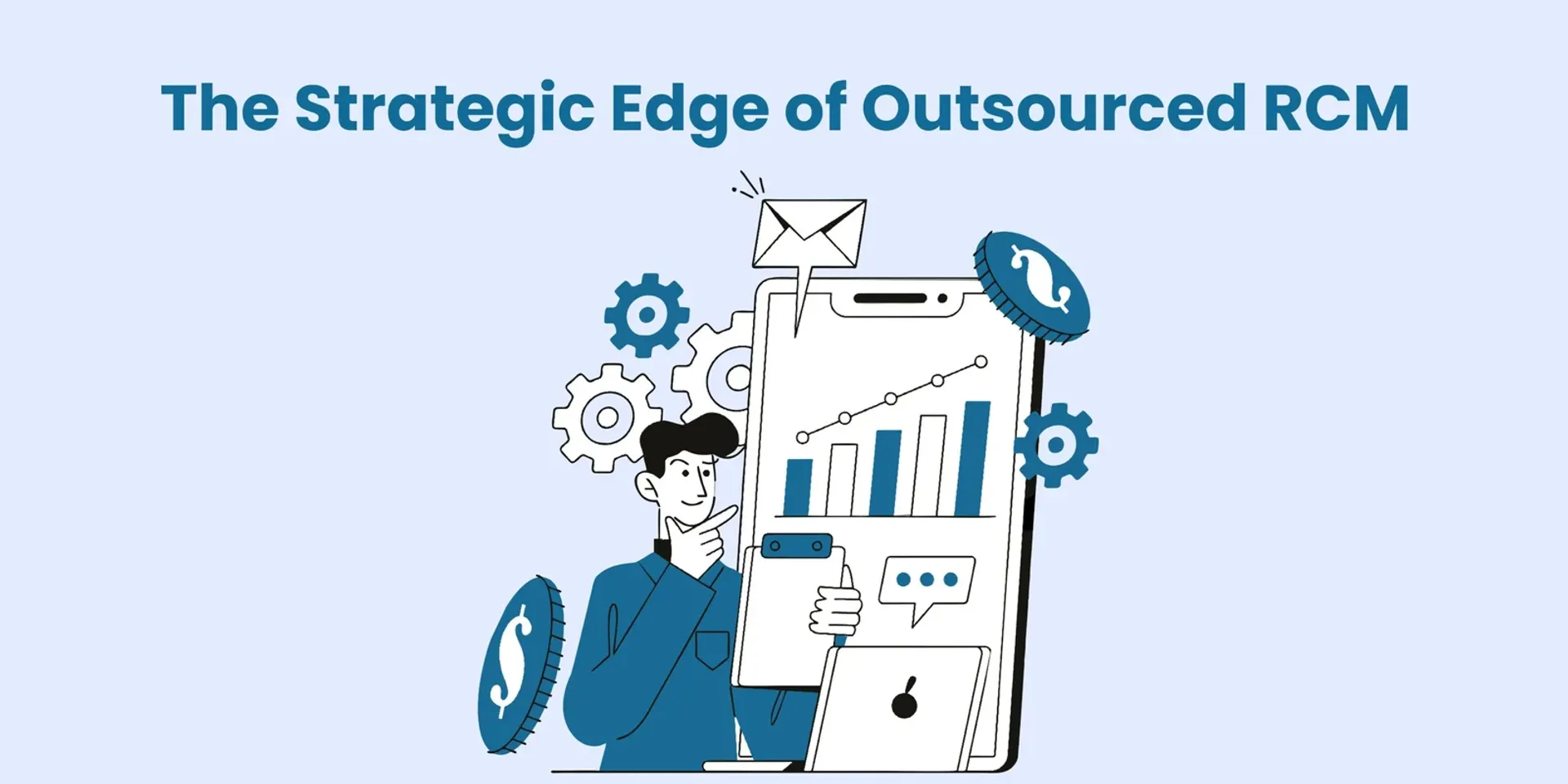Caught in an intricate web of challenges, healthcare providers today are expected to do more with less than ever before. Policy curveballs (like Medicaid cuts under OBBBA), combined with payer bottlenecks, staffing shortages, and skyrocketing costs, are putting their revenue cycle’s vital signs under stress.
For rural hospitals, the situation couldn’t be grimmer. Some have already closed, while many face an imminent risk of closure that could put their communities at risk of losing access to even basic care.
As hospitals fight for financial resilience, healthcare executives are stepping up to change the course with outsourced revenue cycle management (RCM) services. At a time when plugging revenue cycle gaps through extensive hiring or building new-age tech stacks is both costly and unsustainable, RCM outsourcing has emerged as a cost-effective way to move beyond temporary patchwork and build long-term revenue cycle resilience.
That’s why more healthcare executives are betting—and betting big—on outsourced RCM that’s powered by AI and specialized expertise.
A Capacity Crisis, not a Commitment Gap
Hospitals aren’t losing millions because they lack the effort. They are losing because their revenue cycles are expected to do more today than they were ever designed to handle and move at a pace that could outrun:
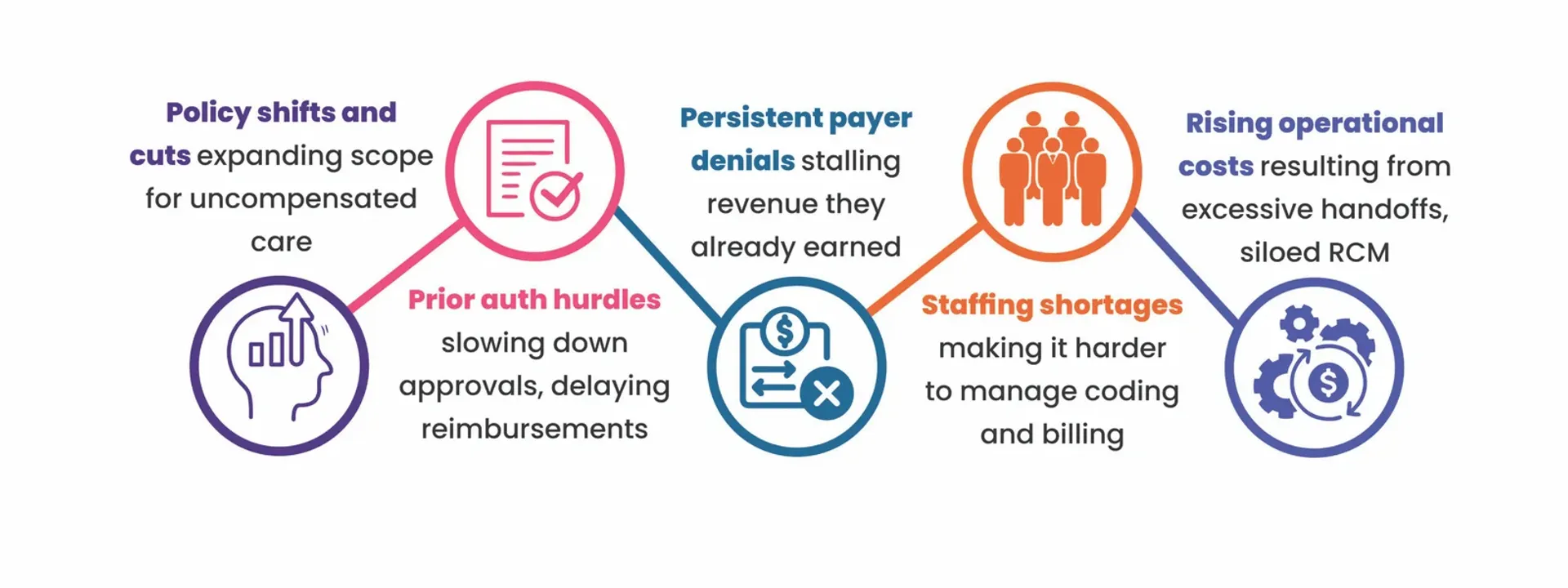 The truth is, it’s a capacity crisis, not a commitment constraint.
The truth is, it’s a capacity crisis, not a commitment constraint.
That’s why more health executives are making the pivot to RCM outsourcing, where they can harness capabilities they lack to fill in systemic gaps and build RCM resilience that can withstand today’s headwinds while preparing for tomorrow’s.
Let’s dive into the top three reasons why healthcare executives are betting big on RCM outsourcing and why it’s time you leap too.
Reason 1: Access to Advanced Technology Without Heavy Upfront Costs
Let’s be realistic. Building a state-of-the-art tech-enabled RCM platform is neither affordable nor sustainable for most hospitals today. It not only demands a high upfront cost but requires specialized expertise to keep the RCM tech stack (AI, automation, analytics, and even next-gen agentic AI in RCM) up to date with payer nuances to deliver real ROI and RCM efficiency at scale.
Even when such investments are viable, RCM often ranks low in the priority order, with most investments made on the clinical side. This makes partnering with a provider that focuses extensively on RCM technology a significant advantage.
That’s why, healthcare providers today are more inclined toward RCM outsourcing, where plug-and-play deployment doesn’t require them to build technology from scratch or infuse millions to make the most of it. By outsourcing RCM, they gain access to new-age tools that can flag and mitigate revenue and compliance risks, prevent denials at their source, and fast-track collections with smart claim queuing.
What Outsourcing Tech-Enabled RCM Looks Like:
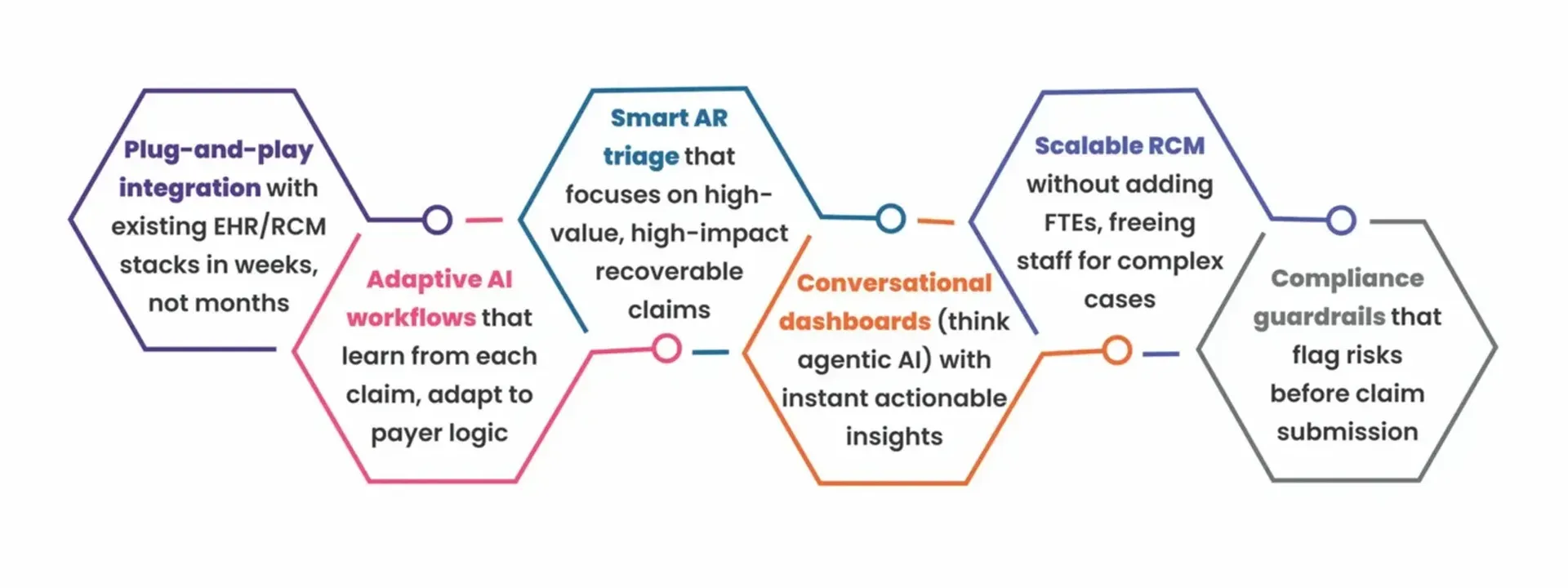
For healthcare revenue cycle leaders, this means not having to spend millions on technology or wait for years for ROI. Instead, they can see measurable ROI in months—without having to break the bank.
- 11.6% increased revenue with outsourcing billing (MGMA)
- 16.9% reduced billing-related costs (MGMA)
- 6.8% boost in collections (Black Book)
- ROI 2–3x greater than the outsourcing cost itself (Black Book)
Put simply, by outsourcing RCM to a tech-enabled partner, healthcare providers get access to advanced tech with the right experts managing the tech stack to drive collections and reduce costs—within months.
Reason 2: Access to Specialized Expertise to Lead RCM End to End
RCM today demands more than transactional exchanges with payers. It’s become a strategic function, right from ensuring accurate eligibility checks, patient responsibility estimation, and prior auth approvals for smooth patient access to billing claims and getting paid correctly within timelines.
All the hustle in between is where specialized RCM expertise on payer nuances and compliance come into play, which in-house teams often lack.
What Outsourcing Expert-Led RCM Looks Like:
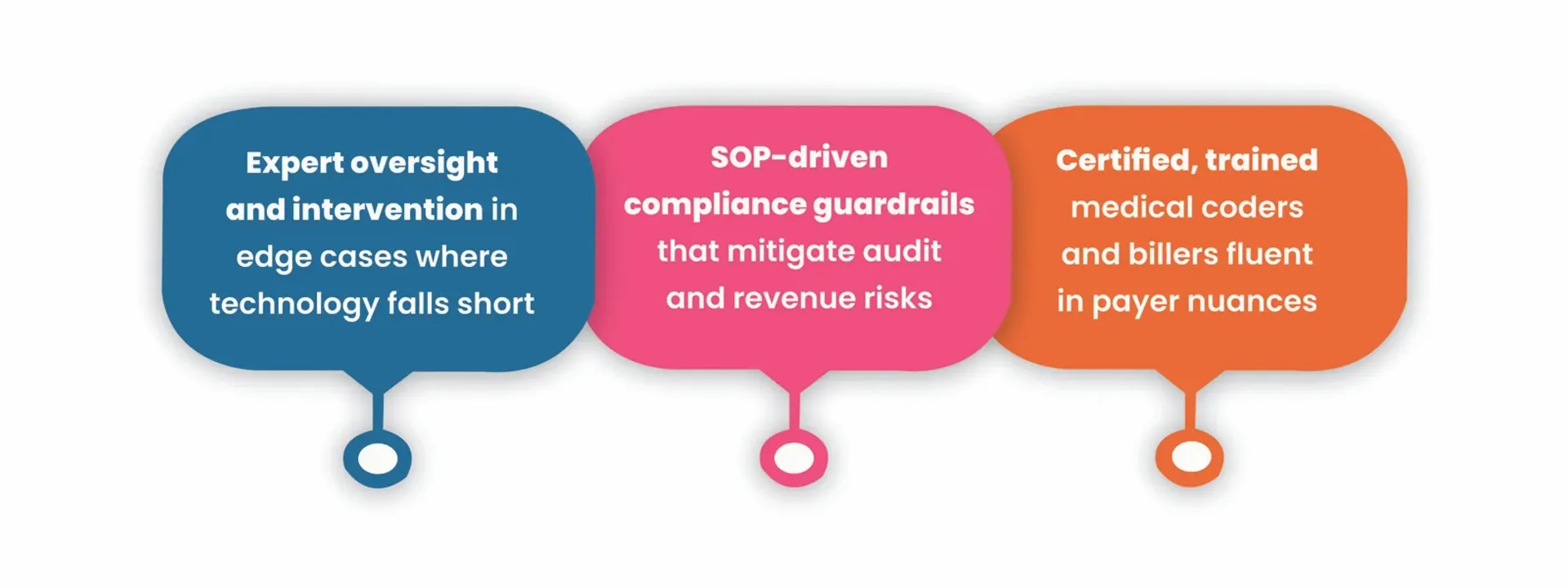
RCM expertise helps build a proactive revenue cycle, with better claim resolution, denial prevention, and appeal management, to recover every dollar earned more efficiently.
Reason 3: Bridging Staffing Gaps while Lowering RCM Costs
In an industry where turnover is alarmingly high in RCM—far higher than the national average—and where staffing gaps continue to exacerbate denials and delays, certified coders and billers are not just hard to recruit but far more difficult to retain.
Even if you get the resources, regularly training them on changing payer rules becomes a costly affair. Moreover, despite training, there lies a high possibility of manual errors that could further increase handoffs and RCM cost burden on your system.
What Outsourcing Cost-Effective RCM Looks Like:
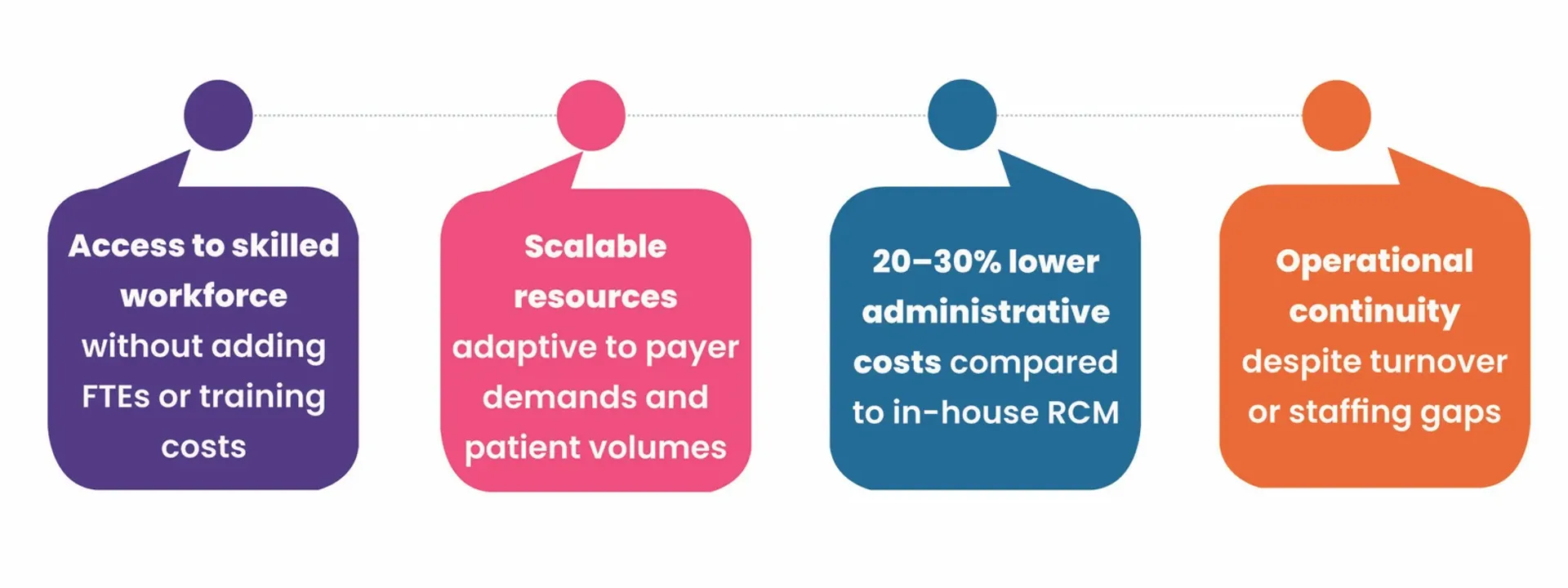
RCM outsourcing helps providers replace fixed labor costs with a performance-driven partnership that delivers cost-efficiency at scale without overwhelming teams.
What AI-Engineered, Expert-Led Outsourced RCM Looks Like
Smarter, Scalable, and Sustainable
With the right blend of technology and expertise, Jindal Healthcare has consistently delivered measurable results for providers with smarter RCM:
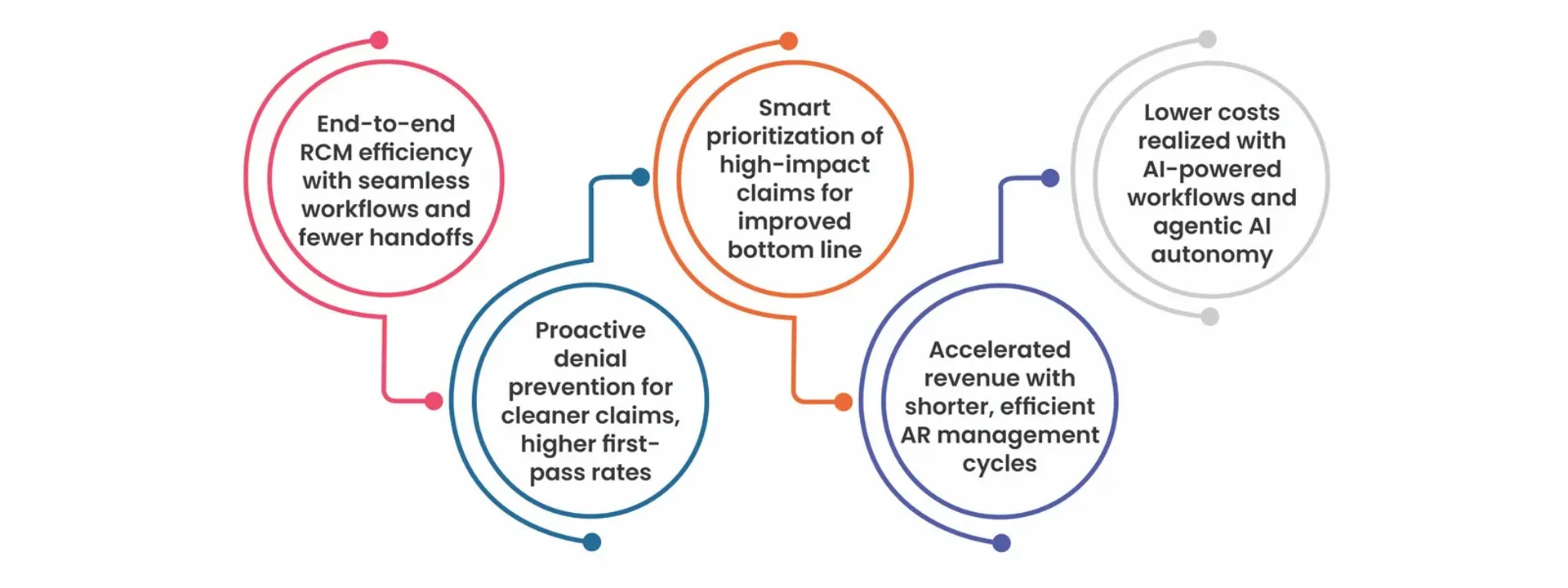 Healthcare providers partnering with Jindal Healthcare aren’t just improving margins and cutting costs with shorter, efficient AR management cycles—they’re future-proofing their revenue cycle to handle policy shifts, payer rules, and market volatility with more confidence.
Healthcare providers partnering with Jindal Healthcare aren’t just improving margins and cutting costs with shorter, efficient AR management cycles—they’re future-proofing their revenue cycle to handle policy shifts, payer rules, and market volatility with more confidence.
Proof in Action: How Organizations Turned the Tide with Jindal Healthcare’s AI-Powered RCM
Customer Success 1:
This rural Oklahoma hospital was struggling to keep its doors open—overwhelmed by staffing gaps, outdated technology, sluggish collections, and the constant churn of payer rules. Prior auth delays, coding errors, and mounting operational costs only made matters worse, pushing it dangerously close to closure.
Outsourcing RCM to Jindal Healthcare became the inflection point. By tapping into our tech-enabled expertise for end-to-end revenue cycle optimization, they not only realized a 38% growth in their collection rate but also built sustainable RCM to withstand challenges while safeguarding access to care for their community.
Impact Delivered:
- 38% Growth in Collection Rate
- 92% Auth Approval Rate
- <72 hours for denial resolution
Customer Success 2:
For a Texas-based DME, revenue cycle cracks were widening fast: 79% AR in the 90+ days bucket, 23% denial rate, and outsourcing that was only adding burden without results.
Inefficiencies had snowballed into a major financial strain until Jindal Healthcare stepped in to re-engineer their revenue cycle with expert-led, AI-powered RCM to build leaner workflows, prevent denials, and drive scalable growth for the group.
Impact Delivered:
- 32% Revenue Growth
- 13x ROI from Aged AR
- 60% Reduced Costs
Why RCM Outsourcing Is Now a Strategic Imperative in Healthcare
As healthcare evolves, it’s bound to demand its stakeholders adaptability more than ever. The AI in RCM debate is no longer about “if” but around “how fast” organizations can implement it to keep up with payer shifts and reduce their operating costs (already 11.1% higher costs than 2024, according to MGMA).
Recent industry surveys show the urgency and the adoption trend of AI in RCM:
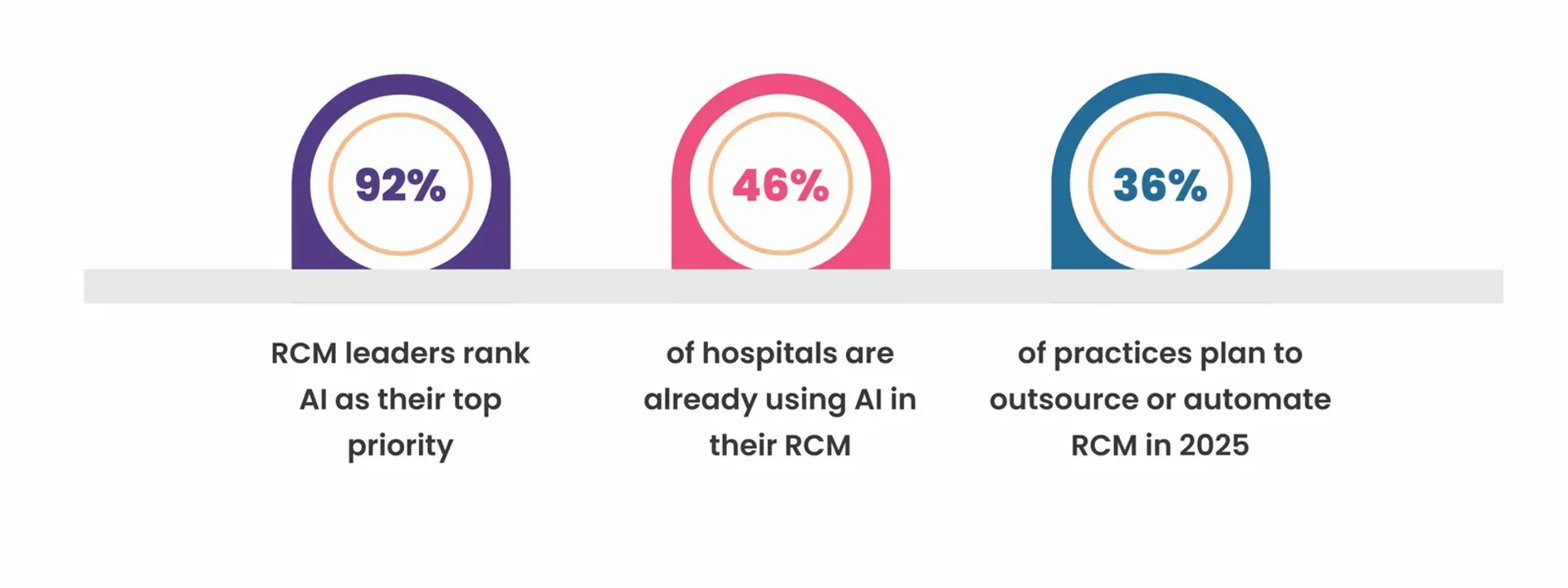 And yet, every month of delay in its adoption is costing healthcare providers revenue with more denials, slower cycles, higher burnout, and rising costs.
And yet, every month of delay in its adoption is costing healthcare providers revenue with more denials, slower cycles, higher burnout, and rising costs.
RCM outsourcing is a strategic enabler for providers today looking to re-engineer their revenue cycles with technology and expertise to drive stronger margins and sustainable growth.
Those who aren’t outsourcing RCM risk falling behind their peers in terms of efficiency-driven collections and costs and, above all, their ability to adapt to future policy shifts.
Book a consultation with Jindal Healthcare today to begin your journey toward a smarter, scalable, sustainable RCM that’s powered by AI and perfected by experts.

